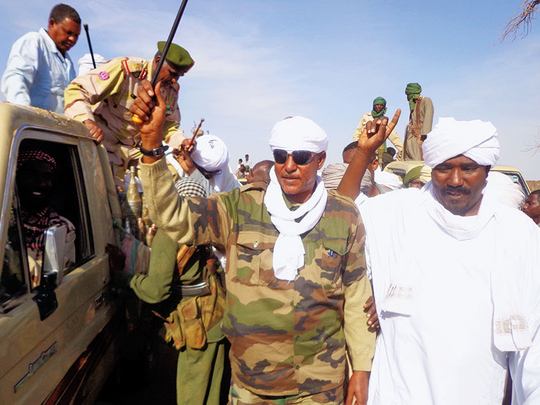
KHARTOUM — By arresting Darfur’s powerful militia chief Mousa Hilal, Khartoum has tightened its control over Sudan’s strife-torn region but analysts say it might open a new chapter of violence.
Hilal, a former aide to President Omar Al Bashir, was arrested last week by Sudan’s counter-insurgency forces near his hometown of Mustariaha in North Darfur state after fierce clashes that left several dead.
“This is a dangerous moment actually,” Magnus Taylor, Sudan analyst with the think tank International Crisis Group, told AFP.
“By taking out Mousa Hilal, they have pitched two different Darfuri Arab tribes against each other.”
Hilal, a powerful leader of the Mahamid tribe, was captured by a unit of the Rapid Support Forces (RSF) led by members of another Arab tribe, Darfur’s biggest, the Rezeigat.
“This is the start of intra-fighting, this is only the beginning,” said Ahmad Adam, a research associate at London University.
“No doubt, Hilal’s arrest will impact the security and stability of Darfur.”
During the initial years of the Darfur conflict that erupted in 2003, Arab militias fought alongside government forces against the region’s black African rebels.
Hilal then led the government-allied Arab Janjaweed militia who swept through Darfur fighting rebels who had taken up arms against the Khartoum government, accusing it of economic and political marginalisation.
The United Nations says hundreds of thousands of people have been killed and another 2.5 million displaced in the conflict.
The RSF has also been used to crush rebels in a brutal counter-insurgency launched by Bashir.
‘Inter-Arab violence’
A joint African Union-United Nations peacekeeping force was deployed in 2007 to bring stability to Darfur — a vast region in western Sudan the size of France.
“The previous dynamic in Darfur was militia versus Darfur rebel groups violence,” Taylor said. “Now the most dangerous element is inter-Arab militia violence.”
Hilal is subject to a United Nations travel ban and on a list of individuals sanctioned for “human rights atrocities” during the early years of the conflict.
Khartoum now insists that the conflict has ended, and it has even launched a campaign to disarm militias operating there.
Analysts say the disarmament campaign is primarily aimed at weakening Hilal — who according to a UN report controls several gold mines in Darfur — after a rift with Khartoum.
“It is mainly about containing or liquidating Mousa Hilal, as well as targeting other black communities and the internally displaced persons,” said Adam, adding that Khartoum had armed these militias in the first place.
Up to 10,000 pro-government fighters led by RSF were mobilised to nab Hilal, who himself commands about 3,000 militiamen, sources said.
With his arrest, Khartoum is sending a signal to the international community that it is “in control” of Darfur, said Taylor.
“Hilal was the big one they wanted to take out. He was seen as becoming this over-mighty figure,” he said.
Although the overall violence has fallen in Darfur, a permanent peace deal between Khartoum and rebels has proved elusive.
With the fall in bloodshed, the UN-African Union peacekeeping mission, known as UNAMID, is now being downsized.
But Hilal’s arrest at a time when UN peacekeepers are scaling back has the potential to unravel much of the gains achieved in Darfur, a European diplomat said.
“This is quite troubling ... Musa Hilal is a very important shaikh who has tribal influence,” he told AFP on condition of anonymity.
“This could trigger a lot of things, a lot of bad things, and UNAMID won’t be able to stop everything.”
— AFP











